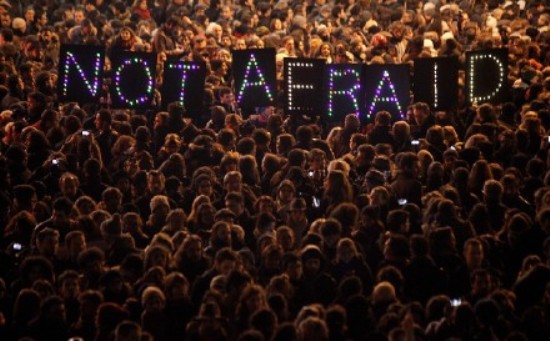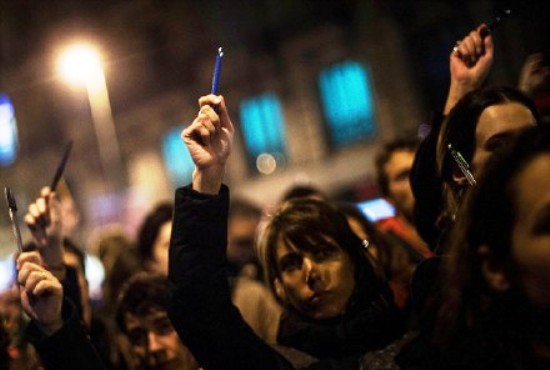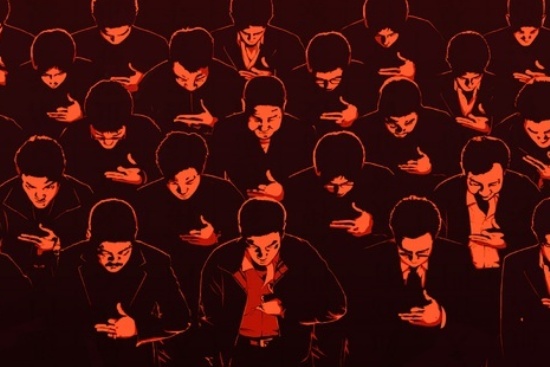Chinese Find Many to Blame for Charlie Hebdo Terrorist Attack
Posted: 01/8/2015 4:51 pm The terrorist attack at French satirical magazine Charlie Hebdo has galvanized China, with widespread coverage and commentary in social media.
The terrorist attack at French satirical magazine Charlie Hebdo has galvanized China, with widespread coverage and commentary in social media.
Chinese news outlets mostly followed the western press in their characterization of the incident as a terrorist attack, with some offering an explainer of the French magazine and its tendency to attract controversy.
 163 published a retrospective of many of the magazine’s lewdest covers, including the Virgin Mary in a compromised position as well as its infamous depiction of the Prophet Muhammad.
163 published a retrospective of many of the magazine’s lewdest covers, including the Virgin Mary in a compromised position as well as its infamous depiction of the Prophet Muhammad.
Sina provided an introduction to Charlie Hebdo, noting that French media has a long tradition of using satire with high-profile targets including royalty, government, police, and banks. However, it notes the magazine was provocative to win an audience because it was a relatively small publication.
Furthermore, Sina says the magazine’s objective is to challenge authority and satirize current political events, but noted the magazine was regularly criticized for being “vulgar” and “heartless”.
 Chinese Weibo users were very forthcoming with their opinions, with some people re-publishing the controversial cartoon depiction of the Prophet Muhammad. But not everybody sided with the magazine:
Chinese Weibo users were very forthcoming with their opinions, with some people re-publishing the controversial cartoon depiction of the Prophet Muhammad. But not everybody sided with the magazine:
空空儿LLP:
This time, Charlie Hebdo is not right.胖纸段:
Everyone could see what was coming from their provocative picture of the Virgin Mary.泳乐浮沉:
Anti-intellectual, low-grade, timid, cruel, narrow-minded, extreme, blood-thirsty, perverted, frantic, ignorant, selfish, shameless, evil, lustful. These are (Charlie Hebdo’s) system of values.JettiaMo:
Right now is a terrible time for print media.瓦格纳罗兰:
Thanks to the author for posting these materials from Charlie Hebdo. It seems that core values can have cultural differences. Any system of values can not violate universal values.Greenbrothers:
Looks like the victims were very narrow-minded.
 One blamed the entire country of France:
One blamed the entire country of France:
信仰的胜利:
This is a non-mainstream magazine in France with a small circulation and readership. Two years ago when US Americans filmed The Innocence of Muslims and were satirizing Muslims, Charlie Hebdo also got in on the action and published a cartoon of the Prophet Muhammad. This caused a controversy that CCTV covered. During such sensitive times, France added fuel to the fire; they are the accomplices to the USA (referred to using a derogatory name), and have attracted the ire of France’s Muslim community. However you look at it, this is not a sensible thing to do as the spark for revenge has already been lit.
One went further, blaming all of Europe:
P212121:
Europe was the one that sinned first. Several hundred years ago, Spain went on a violent crusade and drove all the Muslims out of Europe.
While others place the blame squarely on Islam:
eagles小鹰:
I think that equal treatment is a basic principle. If other people insult you, then you can fiercely insult them back. If other people hit you with their fist, then you fiercely kick back with your foot. However, if you kill someone for insulting you, and you think that this person doesn’t have the right to insult you, then by this logic, how can your family and even your ethnic group be preserved?blue_石头:
(We) should attack evil cults.毛笔小飞:
Muslims are an evil cult, and are a cancer on humanity.北京厨子小号:
This attack has not made me comfortable with certain religions.钉宫喵2:
These ignorant, modern day zealots will soon be the demise of the Muslim religion.葱花子:
Muslims say that if you aren’t a believer, then you can go to hell.
These people were on the fence:
钟微老老实实的名字:
There are limits to humor just as there are for leniency and punishment.联邦论者:
Is this something to teach to the younger generation, or just vulgar claptrap? A print media crisis, or moral crisis?
Here are a few more comments:
看齐1981:
Deep veneration (for the victims)!韩敢敢:
It’s not as though all Muslims want to kill these cartoonists. No matter if they are Muslim, Christian, Buddhists, or material atheists, they are all humans first.
saddie:
Chinese people have a hard time understanding why foreigners would do things to harm others with no benefit to themselves after having satisfying their need for hunger and have nothing left to do. Wouldn’t it be great to be a French citizen with high welfare benefits? The reason to distinguish yourself (in society) is so that you can eat fine food, drink fine wine, and sleep with beautiful women. Everything you can want, beyond your capability to consume it. In fact, this is the only distinction between you and them: in this life, just what are you living for?
hongyuanjue:
You can’t ridicule a belief in RPG’s and AK47, this is common knowledge.
老高高相奎:
The US dropped nuclear bombs on Nagasaki and Hiroshima; this signifies that the US is a terrorist country! Japan should take revenge against the US, this is a righteous action!
Photos: Peninsula Morning Report, Weibo













Comment: China’s online satirists bringing an old tradition to a new medium
Posted: 11/21/2013 11:00 amThe Nanfang occasionally publishes editorial commentary from writers. The opinions expressed below are not the official opinions of The Nanfang. If you’re interested in writing an opinion editorial, please contact us.
The New York Times published an article October 30 titled “Jokes, Lies and Pollution in China“, which explained that humour was one of the ways in which the Chinese public was dealing with the country’s seemingly intractable environmental problems.
Two days later, Tea Leaf Nation wrote of online satirists evoking the spirit of Lu Xun, one of modern China’s most influential literary figures, to mock the growing number of “public confessions” on state media.
The online satire that has flourished in the age of social media is part of a literary tradition that goes back to the early twentieth century, which itself was a reaction to Neo-Confucianism, an ideology that became prominent during the Song Dynasty (960-1279). Neo-Confucianism was blamed by intellectuals such as Lin Yutang for the “stagnation of Chinese culture.”
The most commonly used Chinese translation of the English word “satire” is 讽刺, a word which appears in three significant texts that were published before 900 A.D. These were “The Literary Mind and the Carving of Dragons” by Liu Xie (465-520), “The Book of Sui,” which was completed in 636, and a poem by Tang Dynasty general Gao Pian (821-887).
However, it wasn’t until 1924 that there was a Chinese word that captured the Western concept of “humour” when the Western-educated Lin Yutang transliterated it into the Chinese word 幽默.
Neo-Confucianism was a rationalist philosophy with what Lin Yutang described as a “didactic and dogmatic” tradition under which “the serious became too serious, and the non-serious too vulgar.” The word previously used to mean “funny” 滑稽 had too many low-brow connotations to be effective, according to the essay “Translating Humour into Chinese Culture” by Qian Suoqiao.
While the neo-Confucianists painted Confucius as a conservative and austere figure, Lin pointed to Confucius’ geniality and tendency to laugh at his own expense in various sayings and historical anecdotes.
Although not all shared his philosophy on humour and satire, Lin would go on to influence such major literary figures of the twentieth century as Lao She and Lu Xun. Lao She had this to say about satire:
However, a culture of biting political and social satire that may have blossomed would not become well-established in the People’s Republic of China. This change was most pronounced in the comic form of “crosstalk,” according to Evan Osnos.
While in the 1940s, crosstalk had become an anti-authoritarian and subversive form, the communist government would introduce the Committee for Crosstalk Reform would which censored some scripts and discarded others. This turned crosstalk into a bland mouthpiece for party policy.
As for Lao She, he committed suicide in 1966 after being publicly abused for his writing.
But the culture of satire, as described by Lao She, has had a second wind in the social media age. The microblog “Satirical and critical quotations” this week ran with the post: “When a six year-old American child jokes about wiping out Chinese people, ABC is expected to apologise. Yet when five people are buried alive in Wuhan, nothing happens.” Although it is interesting that a microblog that criticises China in such ways is allowed to exist, the best online satire tends to be more oblique.
Nowadays, most satire is necessarily done by stealth, and online satirists have a Road Runner-ish relationship with the vast army of internet censors.
Resembling the way in which the Hay’s Code of censorship often made for more powerful filmmaking during Hollywood’s silver screen era, Hu Yong, an internet expert and associate professor at Peking University has described censorship as “the mother of creativity.” Hu said: “It forces people to invent indirect ways to get their meaning across, and humour works as a natural form of encryption.”
Chinese humour has always been largely pun-based due to the huge amount of homonyms in the language. The coded language used by online humorists such as Pi San has entered mainstream culture.
This innocent-looking video made by Pi San is actually a tribute to the artist Ai Weiwei made after he was arrested in April 2011.
The animation only refers to Ai Weiwei through exclamations that sound similar to his name and through a reference to his most famous solo exhibition: the 100 million porcelain sunflower seeds he laid out across the floor of the Tate Modern in 2010.
It was described by the New York Times as a “masterpiece of comic subterfuge” and “an indictment of the corrosive effect of censorship on society.”
The style of tackling serious issues in a comical way is back in vogue. The government may grudgingly permit a certain amount of satire to allow the public to let off steam, but authoritarian regimes are not known for their ability to laugh at themselves. The government will be anxious to keep the culture of online satire in check before the laughter becomes loud enough to be dangerous.